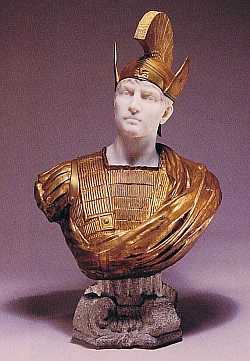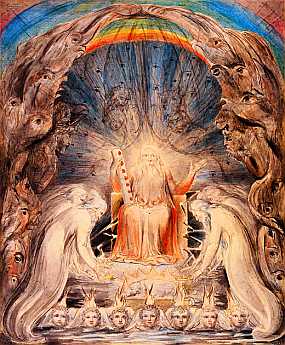And this is eternal life, that they know you the only true God, and Jesus Christ whom you have sent.
—John 17:3
We don’t emphasize that verse enough. Eternal life is knowing the Lord. The great Christian mystics of the past had one goal: to know the Lord. And not just on a surface level, but as deeply as He might reveal Himself to them.
I don’t know how you see it, but I don’t see any conflict there. Nor do I see any problems here:
And after six days Jesus took with him Peter and James and John, and led them up a high mountain by themselves. And he was transfigured before them, and his clothes became radiant, intensely white, as no one on earth could bleach them. And there appeared to them Elijah with Moses, and they were talking with Jesus. And Peter said to Jesus, “Rabbi, it is good that we are here. Let us make three tents, one for you and one for Moses and one for Elijah.” For he did not know what to say, for they were terrified. And a cloud overshadowed them, and a voice came out of the cloud, “This is my beloved Son; listen to him.”
—Mark 9:2-7
For the three disciples, witnessing Jesus’ transfiguration exceeded the first laser light show, the U.S. Bicentennial fireworks display, the 2002 Super Bowl halftime show, and the reunion of The Police—combined. Huge. Mind-blowing. Even terrifying.
And downright mystical.
All across the world and through the ages, people have encountered God alive and moving, speaking into their lives in supernatural ways.  People like Saul on the road to Damascus. Guys like St. Patrick, whose ministry to hundreds of thousands of people sprang from a dream he received as he slept. Or Dwight Moody, one of America’s great evangelists, who encountered God in a mystical, overwhelming way as he walked the streets of New York City, and his ministry immediately transformed in that meeting from good to great.
People like Saul on the road to Damascus. Guys like St. Patrick, whose ministry to hundreds of thousands of people sprang from a dream he received as he slept. Or Dwight Moody, one of America’s great evangelists, who encountered God in a mystical, overwhelming way as he walked the streets of New York City, and his ministry immediately transformed in that meeting from good to great.
So this mysticism thing is awesome, right?
Well, maybe.
Christian mysticism perpetually runs the risk of deviating from the intended target. Aiming for God and hitting something (or someone) entirely different is possible. The wise way to open oneself to God requires a series of personal firewalls intended to keep out anything not of God.
To that end, some have asked me for a list of great Christian writers since 100 AD who’ve written flawless works that can be trusted 100 percent of the time. I’ve included that list below:

Kind of empty isn’t it? That’s for a reason. God never intended for us to swallow everything we hear out of the mouth of someone who self-labels as a Christian. I don’t care if we line our bookshelves with the most orthodox writings known to Man, those books will contain errors. I hope I’m not bursting anyone’s bubble by saying this, but your favorite Christian author/teacher/pastor makes mistakes. True, some make more mistakes than others, but the point remains: we must ALWAYS be discerning in ALL encounters with ideas and practices, be they “Christian” or not.
One of the first posts I wrote for Cerulean Sanctum applies to this issue of Christian mysticism. “Charismatic Churches and the Cult of the New” outlines several flags we must always apply when dealing with anything we encounter presented in the name of the Lord. The following cautions should be considered whenever we approach “new moves of God” within the Church. I originally intended these flags to pertain to charismatic practices, but I believe these also apply to any practice or concept that relates to mysticism:
Flag #1 – Cannot be squared with Scripture or is based on a single verse of Scripture (usually taken out of context.) If we’re doing something that violates Scripture, we need to stop. End of story. If we don’tknow what Scripture says about some mystic practice we wish to employ, better to actually KNOW the Scriptures first before we get all mystical.
Flag #2 – Is pronounced by direct revelation through a single individual or a small group of people. The Church today doesn’t lack for individuals and small groups speaking some strange things. I don’t believe that the Lord speaks “unusual” truth through one person or a small group alone. He may speak to you for your needs, but the whole “mystic secrets of divine union for select disciples who pay $200” thing isn’t going to wash with the Lord.
Flag #3 – Is considered relevant for today, yet has no historic precedent in the Church. Nothing new under the sun, folks. If the Church through the ages didn’t practice or teach it, it probably ain’t kosher.
Flag #4 – Attempts to make a New Testament practice/theology of an Old Testament practice/theology rendered moot by the finished work of Christ. While this plagues certain aspect of the charismatic movement more so than the mystic community, it’s still something to watch for.
Flag # 5 – Involves “Restoring or the “Restoration of a practice or theology. Some things died out for a reason. Yes, a few good practices have been neglected by us hypermoderns, but we must be careful.
Flag #6 – Is a “redeemed version of a secular/occult concept or practice (usually which has been abandoned or discredited by secular/occult practitioners.) A huge flag when dealing with anything deemed mystical. (I’ll unpack this more below when I talk about syncretism.)
Flag #7 – May produce immediate results, but does not move the Church or individual into a deeper, biblically-based relationship with Christ in the long run. Practicing mysticism for mysticism’s sake will get us nowhere. All too often, a fascination with mysticism reflects failing to pursue God in approved, traditional ways. Those must always be addressed first. All the mysticism in the world’s not going to make an infant in Christ into an adult. Got to make it to the teen years of the Faith before reaching adulthood.
Critics of contemporary mysticism in the Church have good reason to point out troubles. Any two of the flags above in combination should entail a gut check about the practice or idea we’re attempting to incorporate into our spiritual lives.
With Christianity in the West so heavily compromised by syncretism, if we wish to be a holy Bride, then we can’t keep whoring around. Too many Christians who are looking into mysticism don’t have the spiritual maturity or common discernment sense to know what’s genuinely of God and what’s not. Since the critics of Christian mysticism love to blanket condemn, clashes will be constant. For the chucklehead who wonders how well astral projection and Christianity work together, good for the critics for calling him on his folly. We’ve got so many Christians lacking in even basic discernment skills that perhaps a place may exist for the blanket condemnation. A sad state of affairs, but given the tendency to let all the garbage in 24/7/365, possibly warranted. We have only ourselves to blame for the critics’ hypersensitivity.
The thing about the old Christian mystics? They’d already gone through all the steps of growth and maturity. And that’s the key point here. The Cloud of Unknowing may very well grow us deeper in God. But if we’re not reading and meditating on the Scriptures, cultivating a consistent prayer life, making disciples, or laying down our lives for others, we’ve got no right to pick up that book and start yammering about how deep it is and how it’s going to take us to “the next level.” You don’t give an infant a powerful weapon like an AK-47 to play with, because if you do, someone’s going to get killed. And for the purposes of this illustration, it’s usually the infant.
The riches of the Lord are His and His alone. Looking into Buddhist (or any other non-Christian) mysticism to apply what one my find to Christianity is like panning for gold in a field of manure. God’s already got a river flowing with gold, no need to wade through the crap. Yet all too often we try to find truth in places it doesn’t exist. If we truly believe that Jesus is the Way, the Truth, and the Life, searching for Him by syncretizing rituals gleaned from the places He’s not couldn’t be a bigger waste of time. All too often, those dabbling in Christian mysticism do just that.
Get the basics of the Faith down first. Stay away from syncretistic practices that attempt to join Christ and Belial. Test every spirit to see if it’s of God (the flags above are a good start). Be as wise as snakes and as innocent as doves—not the other way around.
Yes, sometimes the critics are off-base. But then again, once in a while they’re not. It pays to listen to them and weigh what they have to say against the Scriptures and the Spirit.
I’ll conclude this mini-series in my next post.
 The Scriptures describe three distinctives of this soldier:
The Scriptures describe three distinctives of this soldier:
 Unlike Peter above, they’ve opened their minds to too many foreign sources of supposed truth, only to stumble into error.
Unlike Peter above, they’ve opened their minds to too many foreign sources of supposed truth, only to stumble into error. People like Saul on the road to Damascus. Guys like St. Patrick, whose ministry to hundreds of thousands of people sprang from a dream he received as he slept. Or Dwight Moody, one of America’s great evangelists, who encountered God in a mystical, overwhelming way as he walked the streets of New York City, and his ministry immediately transformed in that meeting from good to great.
People like Saul on the road to Damascus. Guys like St. Patrick, whose ministry to hundreds of thousands of people sprang from a dream he received as he slept. Or Dwight Moody, one of America’s great evangelists, who encountered God in a mystical, overwhelming way as he walked the streets of New York City, and his ministry immediately transformed in that meeting from good to great.